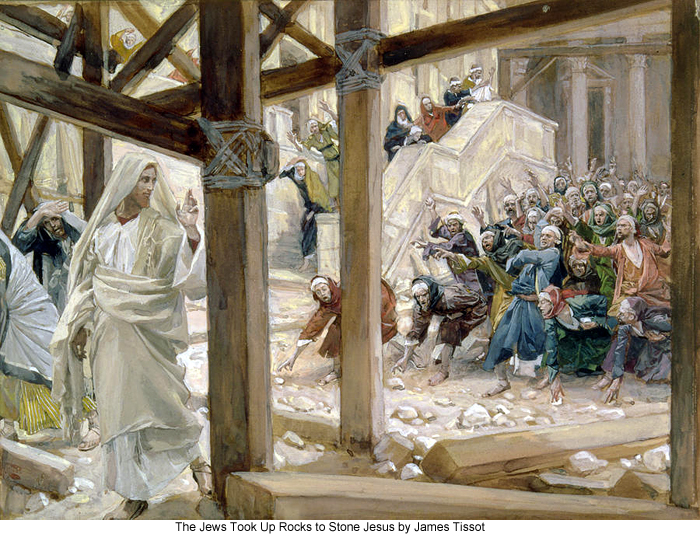Yesterday‘s Gospel ended with the Jews taking up stones because Jesus claimed he was God. Today’s Gospel takes up John’s account a few chapters later, after Jesus heals the man born blind (John 9) and preaches the Good Shepherd discourse (John 10:1–22). The Jews have once again taken up stones and he challenges them about it. They believe his claim to be God is blasphemy, and he points them back to the many signs he has already performed that show they should believe in him. For them Jesus is either crazy, a blasphemer, or both. For them it’s unthinkable that God could be standing before him, which is why to rationalize how he could be performing these signs they claim he has a demon (John 7:20, 8:48-49, 10:20-21): possession would make him crazy and able to have powers. Even that explanation does not hold weight for everyone in the crowd, because some of his signs are to great for them to conceive anyone other than God doing them (see John 10:21).
As John’s account tells us, Jesus has to escape and hide now to avoid arrest. John no longer simply says his hour had not yet come. The “hour” in John’s Gospel refers to Jesus’ Passion and death, and it is close. Despite the charged atmosphere and hostility the Word sown has begun to bear fruit. People come to Our Lord across the Jordan and continue to follow and believe in him because of the signs he has performed. They know those signs could only be explained by Our Lord being sent by God. It’s poignant that the story comes full circle, back to where John had been baptizing; John had pointed to Our Lord and testified to him being the Lamb of God who takes away the sins of the world, the greatest power of all. Now the Lamb is gathering his disciples around himself not long before before he does take away the sins of the world on the Cross.
Our Lord still works signs, but to those who have faith. When he appears after the Resurrection, he only appears to those who had faith in him. Make this last week of Lent a moment of prayer where you contemplate the things Our Lord has worked in your life. He’s always willing to reveal something new.
Readings: Jeremiah 20:10–13; Psalm 18:2–7; John 10:31–42.


